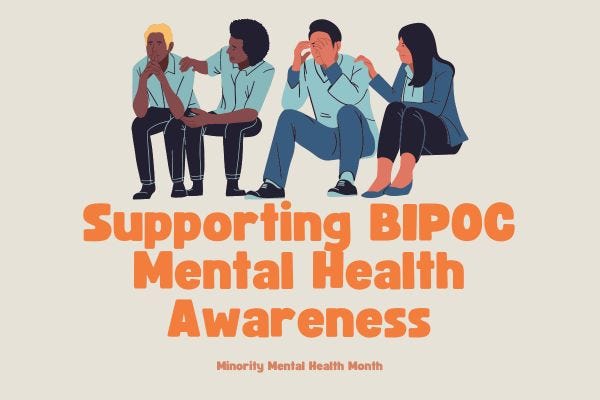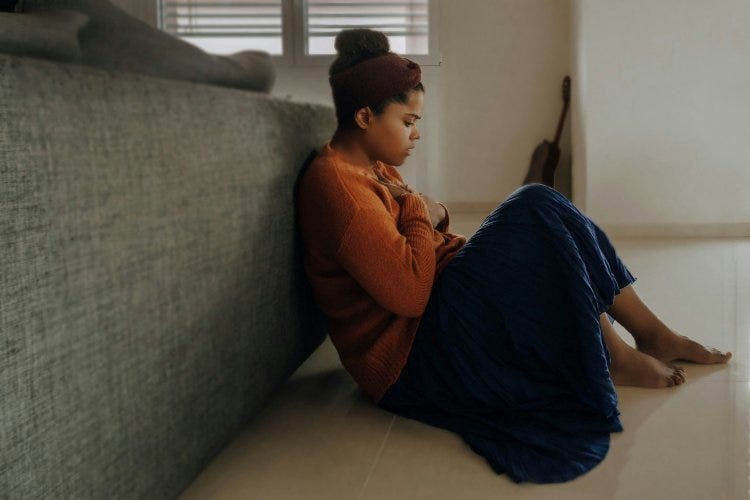
July 08, 2024
July marks the start of mental health awareness month in BIPOC (Black, Indigenous, & People of Color) communities. As a BIPOC therapist, myself, who provides mental health counseling to parents in this community, I understand the importance of bringing awareness to how the unique life experiences of a person of color can impact their mental health.
 Often when we talk about mental health, we talk about how our emotional, mental, and social well-being impacts the way that we act, manage stress, and make choices. However, there are other factors to take into consideration when we are talking about a BIPOC individual such as, poverty, access to health care, lack or education, and/or experiencing or witnessing racism. Though the topic of mental health awareness continues to grow, there are still some barriers in accessing mental health services as a person of color.
It is not uncommon when I first meet with a client from the BIPOC community to say, “I grew up thinking that talking to a therapist meant you’re crazy”; or “In my community, we don’t sit and talk about our feelings, we just keep it pushing…” and then it is often followed by “BUT I want to do something different than what my family does….” or “BUT I have been really struggling and you look like me so I thought I’d give it a shot….”.
Many times, I have been the first therapy experience of moms or dads who need support in managing their mental health in this parenthood journey. There is something about becoming a parent that sometimes prompts us to reflect on our own life experiences and the impact that they have on how we show up as parents. And so, they seek support.
The reality is the ability to be able to access mental health services may not always be an option due to lack of health insurance. Thankfully, this is changing but this means that our parents [the current grandparents] may not have had the opportunity to seek support if needed and that has influenced how we manage our life experiences.
I am thankful for the continued growth of sharing information about managing various mental health symptoms especially as a parent. I get asked often, “how do I support someone who I know is struggling with their mental health. I don’t even know what to say.” And my response is often the same…...
Often when we talk about mental health, we talk about how our emotional, mental, and social well-being impacts the way that we act, manage stress, and make choices. However, there are other factors to take into consideration when we are talking about a BIPOC individual such as, poverty, access to health care, lack or education, and/or experiencing or witnessing racism. Though the topic of mental health awareness continues to grow, there are still some barriers in accessing mental health services as a person of color.
It is not uncommon when I first meet with a client from the BIPOC community to say, “I grew up thinking that talking to a therapist meant you’re crazy”; or “In my community, we don’t sit and talk about our feelings, we just keep it pushing…” and then it is often followed by “BUT I want to do something different than what my family does….” or “BUT I have been really struggling and you look like me so I thought I’d give it a shot….”.
Many times, I have been the first therapy experience of moms or dads who need support in managing their mental health in this parenthood journey. There is something about becoming a parent that sometimes prompts us to reflect on our own life experiences and the impact that they have on how we show up as parents. And so, they seek support.
The reality is the ability to be able to access mental health services may not always be an option due to lack of health insurance. Thankfully, this is changing but this means that our parents [the current grandparents] may not have had the opportunity to seek support if needed and that has influenced how we manage our life experiences.
I am thankful for the continued growth of sharing information about managing various mental health symptoms especially as a parent. I get asked often, “how do I support someone who I know is struggling with their mental health. I don’t even know what to say.” And my response is often the same…...
As I said earlier, there are some struggles that can arise with being a parent. Naturally, we turn to coping skills that have helped in the past, but sometimes we aren’t able or don’t want to engage in those habits and so it is time to start something different. I often suggest, let’s start back with the basics and that means how are we taking care of our body. When we are going through a hard time, the last thing we are often thinking about is what can we do for ourselves especially as parents; and so, I challenge you to take a moment to think about yourself.
Ask yourself:
 Often when we talk about mental health, we talk about how our emotional, mental, and social well-being impacts the way that we act, manage stress, and make choices. However, there are other factors to take into consideration when we are talking about a BIPOC individual such as, poverty, access to health care, lack or education, and/or experiencing or witnessing racism. Though the topic of mental health awareness continues to grow, there are still some barriers in accessing mental health services as a person of color.
It is not uncommon when I first meet with a client from the BIPOC community to say, “I grew up thinking that talking to a therapist meant you’re crazy”; or “In my community, we don’t sit and talk about our feelings, we just keep it pushing…” and then it is often followed by “BUT I want to do something different than what my family does….” or “BUT I have been really struggling and you look like me so I thought I’d give it a shot….”.
Many times, I have been the first therapy experience of moms or dads who need support in managing their mental health in this parenthood journey. There is something about becoming a parent that sometimes prompts us to reflect on our own life experiences and the impact that they have on how we show up as parents. And so, they seek support.
The reality is the ability to be able to access mental health services may not always be an option due to lack of health insurance. Thankfully, this is changing but this means that our parents [the current grandparents] may not have had the opportunity to seek support if needed and that has influenced how we manage our life experiences.
I am thankful for the continued growth of sharing information about managing various mental health symptoms especially as a parent. I get asked often, “how do I support someone who I know is struggling with their mental health. I don’t even know what to say.” And my response is often the same…...
Often when we talk about mental health, we talk about how our emotional, mental, and social well-being impacts the way that we act, manage stress, and make choices. However, there are other factors to take into consideration when we are talking about a BIPOC individual such as, poverty, access to health care, lack or education, and/or experiencing or witnessing racism. Though the topic of mental health awareness continues to grow, there are still some barriers in accessing mental health services as a person of color.
It is not uncommon when I first meet with a client from the BIPOC community to say, “I grew up thinking that talking to a therapist meant you’re crazy”; or “In my community, we don’t sit and talk about our feelings, we just keep it pushing…” and then it is often followed by “BUT I want to do something different than what my family does….” or “BUT I have been really struggling and you look like me so I thought I’d give it a shot….”.
Many times, I have been the first therapy experience of moms or dads who need support in managing their mental health in this parenthood journey. There is something about becoming a parent that sometimes prompts us to reflect on our own life experiences and the impact that they have on how we show up as parents. And so, they seek support.
The reality is the ability to be able to access mental health services may not always be an option due to lack of health insurance. Thankfully, this is changing but this means that our parents [the current grandparents] may not have had the opportunity to seek support if needed and that has influenced how we manage our life experiences.
I am thankful for the continued growth of sharing information about managing various mental health symptoms especially as a parent. I get asked often, “how do I support someone who I know is struggling with their mental health. I don’t even know what to say.” And my response is often the same…...
Share About Your Own Mental Health Struggles or Wins
The stigma of seeking mental health support actively still impacts the BIPOC community. So, share about what you are going through. This doesn’t mean that you need to share in detail everything that is going on but even just saying, “My therapist has really been helping me as I go through this tough season....” normalizes seeking support when necessary. Unfortunately, with the stigma of mental health comes self-stigma, which is how we apply the stereotypes and discrimination from the public to ourselves. Many parents in the BIPOC community believe that mental illness can be fixed through willpower alone. This keeps us from reaching out and asking for help. Let’s start off with normalizing seeking mental health support. Since many individuals in the BIPOC community may be seeking support for the first time, a question that I get often is, “So what do I need to do to feel like myself again?” or “Is there something specific that I need to do to change?” This is an example of how the idea that willpower will get you through the rough patch is prominent. Now, I’m not saying that willpower is not efficient, it can be, but also, sometimes it can just keep us from coping with the current mental health struggle. And so, if you are going through a tough time, I would suggest starting with small changes. Engage in Healthy, Realistic Changes to Improve Your Mental Health
Engage in Healthy, Realistic Changes to Improve Your Mental Health
As I said earlier, there are some struggles that can arise with being a parent. Naturally, we turn to coping skills that have helped in the past, but sometimes we aren’t able or don’t want to engage in those habits and so it is time to start something different. I often suggest, let’s start back with the basics and that means how are we taking care of our body. When we are going through a hard time, the last thing we are often thinking about is what can we do for ourselves especially as parents; and so, I challenge you to take a moment to think about yourself.
Ask yourself:
- When is the last time I ate?
- Have I had some water recently?
- How’s my energy feeling? Do I need to rest?
- Have I moved my body today intentionally?





















